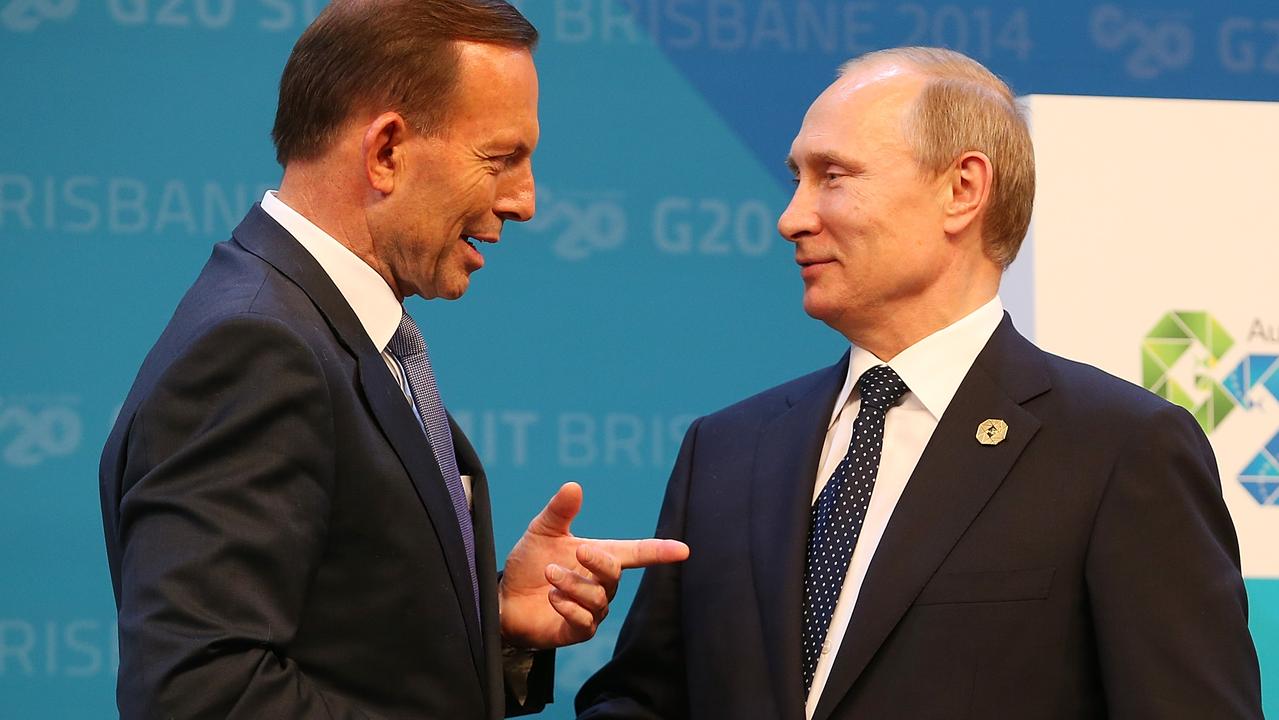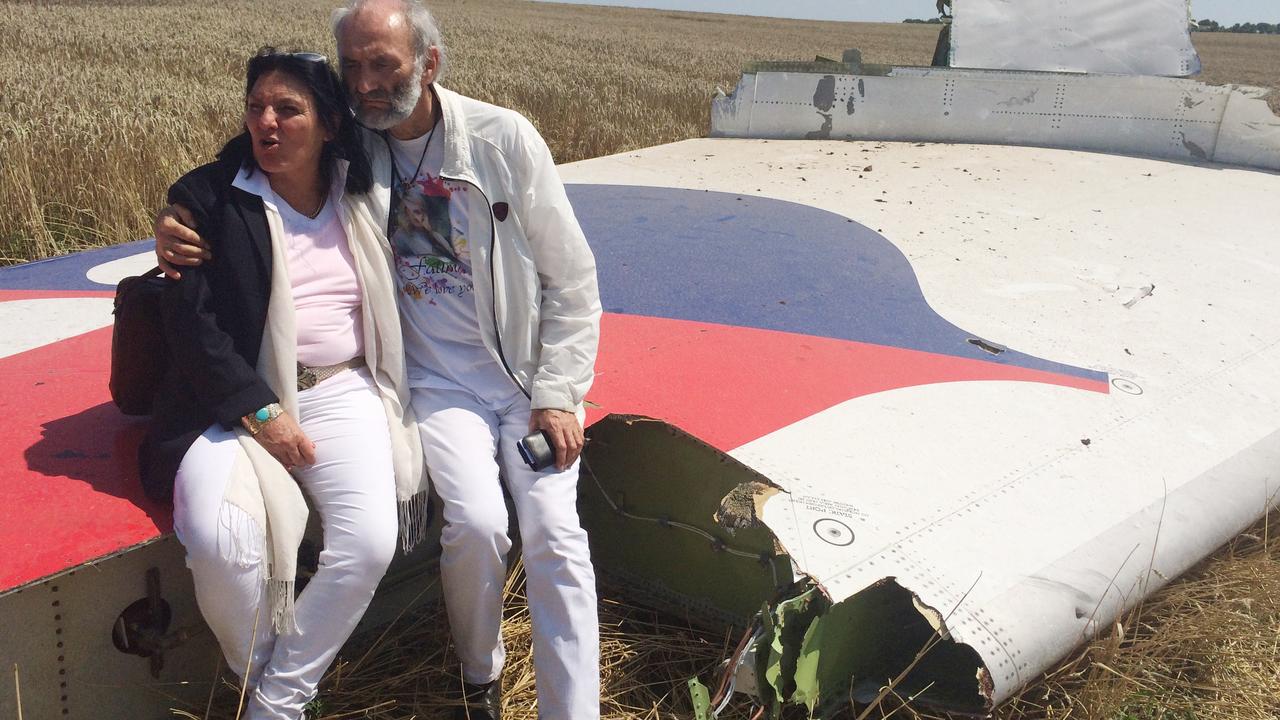Shelling around MH17 site blocks Australian Federal Police
HEAVY shelling around the crash site of downed Malaysian flight MH17 has forced Australian and Dutch police to scrap a planned visit for now.

HEAVY shelling around the crash site of downed Malaysian flight MH17 tonight forced Australian and Dutch police to scrap a planned visit for now as they sought to secure the scene 10 days after the disaster.
Earlier Prime Minister Tony Abbott said Australian Federal Police officers would be part of a Dutch-led humanitarian mission in eastern Ukraine that could take weeks to complete its task. The officers would be unarmed even though Mr Abbott admitted it would be a risky mission.
Mr Abbott had said 49 officers from The Netherlands and Australia — which together lost some 221 citizens in the crash — were due at the scene today and that there would be “considerably more on site in coming days”.
That came after Malaysian Prime Minister Najib Razak said he had reached an agreement with the pro-Russian insurgents controlling the site to allow the police deployment.
“I hope that this agreement … will ensure security on the ground, so the international investigators can conduct their work,” Mr Razak said, adding that 68 Malaysian police personnel would leave Kuala Lumpur for the crash site on Wednesday.
The contingent of law enforcement officers had been due to head to the location after a deal was struck with rebels aimed at allowing a long-delayed probe into the tragedy to go ahead.
But international observers overseeing the trip had to abruptly ditch their plans tonight after clashes shattered a supposed truce between government forces and insurgents in the area around the site, where some remains of the 298 victims still lie decomposing under the summer sun.
“There is fighting going on. We can’t take the risk,” said Alexander Hug, deputy chief monitor of the European security body OSCE’s special mission in Ukraine.
“The security situation on the way to the site and on the site itself is unacceptable for our unarmed observer mission,” he told reporters in the insurgent stronghold Donetsk, the biggest city in the region.
An AFP photographer heard artillery bombardments just a kilometre from the rebel-held town of Grabove next to the crash site and saw black smoke billowing into the sky.
Terrified local residents were fleeing and checkpoints controlled by separatist fighters were abandoned.
The Dutch justice ministry confirmed that security advisers had halted their team from visiting the site.
“The team of 30 Dutch forensic experts currently has no safe access to the disaster site. Because of fighting in the area, the situation is still too unstable to work at the crash site,” the ministry said in a statement.
So far investigators have been able to visit the site only sporadically because of security concerns.
A truce had been called in the immediate area around the site by both the Kiev forces and pro-Russian separatists, but just 60km away, the Ukrainian army had continued with their offensive to retake Donetsk.
The industrial hub, which has been serving as a base for international monitors and journalists who are travelling daily to the crash site, came under intense fire overnight.
The sounds of heavy bombardment — some of it apparently unguided Grad rocket fire — could be heard throughout the night in Donetsk and there were bursts of gunfire in the deserted city centre.
The insurgents have also handed over a sealed train carriage filled with victims’ belongings to Dutch authorities, who are leading the probe into downing of the plane — allegedly by the rebels.
About 1000 people — including the victims from the Malaysian plane crash — have been killed in the deadly insurgency, and the United Nations estimates that some 230,000 have fled their homes.
The Red Cross has said the country is now in a civil war — a classification that would make parties in the conflict liable to prosecution for war crimes.
In Canberra, Mr Abbott told reporters today: “Our objective is to get in, get cracking and to get out.”
Until now rebels around the crash site have limited foreign access to the site to small numbers of investigators and observers.
Mr Abbott said “full and frank talks” in the rebel-held city of Donetsk yesterday had led to the universal view there should be a ceasefire at the crash site while the mission conducted its work. F
Fighting between government forces and separatists is raging just 60km away, with loud explosions heard at regular intervals in the western and northern suburbs of Donetsk.
While not referring directly to the separatists, Mr Abbott said “local people” had guaranteed the mission’s security.
However, he admitted those taking part in the mission would not be “perfectly safe”.
“Frankly, we need to be prepared to take some risks in order to do the right thing by our dead and by their grieving families.” Mr Abbott noted there had been a “fair bit of goodwill” from locals in the area, especially since a UN Security Council resolution called for an independent investigation.
The common feeling was that the bringing down of the Malaysia Airlines plane by a surface-to-air missile, killing all 298 people aboard, was “dreadful beyond words”.
The mission will not be backed up by military personnel although the Australian Defence Force is providing some enabling support including medical and surgical teams.
The AFP has about 170 officers deployed in Ukraine and they will be rotated through the site as needed during the next few weeks. Mr Abbott said it was clear the crash site still contained unrecovered human remains.
So far about 200 bodies and remains have been taken from the site for identification by Dutch authorities in Eindhoven.
One person, a Dutch citizen, has been formally identified.
The unarmed nature of the mission means it won’t need the specific approval of the Ukrainian parliament to proceed.
Foreign Minister Julie Bishop, speaking from Amsterdam, stressed the mission would be a non-threatening operation.
“All we want to do is secure the site so that we can inspect it thoroughly and bring back any remains,” she said.
The Prime Minister’s special envoy Angus Houston said the mission would be a “non-aggressive, non-threatening force” so that no nobody would interfere with it.
Labor leader Bill Shorten, who was briefed by Mr Abbott today, offered the government the opposition’s full support for the mission.
“In a dangerous and volatile environment, this is the most sensible course of action,” he said.
AFP



To join the conversation, please log in. Don't have an account? Register
Join the conversation, you are commenting as Logout